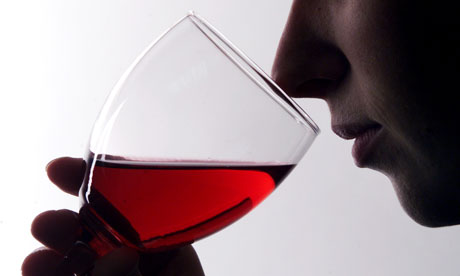Expensive wine and cheap plonk taste the same to most people
In a blind taste test, volunteers were unable to distinguish between expensive and cheap wine
People fool themselves into thinking expensive wines taste better than cheap ones, says psychologist Richard Wiseman. Photograph: Graham Turner/Guardian
An expensive wine may well have a full body, a delicate nose and good legs, but the odds are your brain will never know.
A survey of hundreds of drinkers found that on average people could tell good wine from plonk no more often than if they had simply guessed.
In the blind taste test, 578 people commented on a variety of red and white wines ranging from a £3.49 bottle of Claret to a £29.99 bottle of champagne. The researchers categorised inexpensive wines as costing £5 and less, while expensive bottles were £10 and more.
The study found that people correctly distinguished between cheap and expensive white wines only 53% of the time, and only 47% of the time for red wines. The overall result suggests a 50:50 chance of identifying a wine as expensive or cheap based on taste alone – the same odds as flipping a coin.
Richard Wiseman, a psychologist at Hertfordshire University, conducted the survey at the Edinburgh International Science Festival.
"People just could not tell the difference between cheap and expensive wine," he said. "When you know the answer, you fool yourself into thinking you would be able to tell the difference, but most people simply can't."
All of the drinkers who took part in the survey were attending the science festival, but Wiseman claims the group was unlikely to be any worse at wine tasting than a cross-section of the general public.
"The real surprise is that the more expensive wines were double or three times the price of the cheaper ones. Normally when a product is that much more expensive, you would expect to be able to tell the difference," Wiseman said.
People scored best when deciding between two bottles of Pinot Grigio, with 59% correctly deciding which was which. The Claret, which cost either £3.49 or £15.99, fooled most people with only 39% correctly identifying which they had tasted.
In 2008, a study led by Adrian North, a psychologist at Heriot-Watt University in Edinburgh, claimed that music helped boost the flavour of certain wines. North, who was commissioned by a Chilean winemaker, reported that Cabernet Sauvignon was most affected by "powerful and heavy" music, while Chardonnay benefited from "zingy and refreshing" sounds.

No comments:
Post a Comment